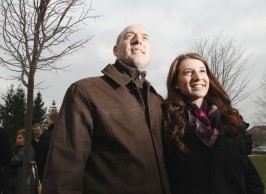BY ANDREW DUFFY, OTTAWA CITIZEN NOVEMBER 9, 2012
 Here, Dr. Marty Friedlich stands proudly with his daughter Jaclyn, 17, who spoke eloquently at the ceremony about her family that was saved by Wallenberg. Photograph by: Julie Oliver , Ottawa Citizen
Here, Dr. Marty Friedlich stands proudly with his daughter Jaclyn, 17, who spoke eloquently at the ceremony about her family that was saved by Wallenberg. Photograph by: Julie Oliver , Ottawa CitizenA tree planting ceremony at a park on Viewmount Drive in Nepean took place Friday to commemorate the heroism of Raoul Wallenberg, the Swedish diplomat who saved tens of thousands of Hungarian Jews during World War II.
OTTAWA — Ottawa’s Jaclyn Friedlich is part of the universe of humanity that today owes its existence to one man, Raoul Wallenberg, who sabotaged the Nazi death machine with paper and defiance during the Second World War.
Friedlich, a Grade 12 student at Ashbury College, took part Friday in a tree planting ceremony to commemorate the 100th anniversary of Wallenberg’s birth.
Her grandfather, Thomas Friedlich, was among thousands and thousands of people saved by Wallenberg, a Swedish diplomat who issued protective passports to Hungarian-Jews in 1944 as the Nazis accelerated the “Final Solution,” their plan to exterminate European Jews.
“Without him, I wouldn’t be here,” said 17-year-old Jaclyn, the daughter of Ottawa surgeon Dr. Martin Friedlich.
“I think it’s so amazing how brave Wallenberg was,” she says.
Jaclyn and her father are among 17 Canadian descendants of the four Friedlichs rescued by Wallenberg.
In March 1944, German forces invaded Hungary to install a new, more compliant government. Soon after, the mass deportation of Hungarian Jews began.
Within four months, more than 400,000 Jews had been sent to Auschwitz-Birkenau in southern Poland, where the vast majority of them perished.
Wallenberg arrived in Hungary in July 1944 as SS officer Adolf Eichmann turned his sights on the 230,000 Jews still living in the nation’s capital, Budapest.
Wallenberg, a Swedish businessman educated in the United States, had been recruited by U.S. authorities to lead an effort to save the Jews of Budapest.
They represented the largest Jewish community left in Europe.
Attached to the Swedish embassy — Sweden was a neutral country during the war — Wallenberg began distributing Schutz-Passes in a desperate bid to safeguard the city’s Jews.
The Schutz-Pass identified its bearers as Swedish subjects and conferred upon them the protection of the embassy. The documents held no weight in international law, but they were impressive-looking — stamped with the three crowns of Sweden — and Wallenberg aggressively defended their value in repeated confrontations with German and Hungarian Nazis.
Wallenberg also arranged more than 30 safe houses to protect Budapest’s Jews.
Jaclyn Friedlich’s great-grandfather Lewis and her great-uncle Steven were taken by the Nazis to a labour camp in 1944 and forced to dig trenches for German soldiers as they battled the advancing Russians.
Lewis Friedlich lost 26 kilograms in the forced labour camp before his wife, Aurelia, obtained for each of them a Wallenberg Schutz-Pass.
It allowed them to return to Budapest where the family took refuge in one of the city’s safe houses. There, Lewis Friedlich met Wallenberg, who came each day to ensure that Jewish workers returned safely from their assignments.
“He was a very warm hearted person who helped several thousand Jews escape from the gas chambers,” Friedlich wrote in his memoirs.
Lewis Friedlich survived the war and escaped communism in 1949 by walking with his family to Austria. The Friedlichs and their two sons emigrated to Canada, where Thomas became a doctor and Steven an engineer.
